Sung-Chul+Shin
-
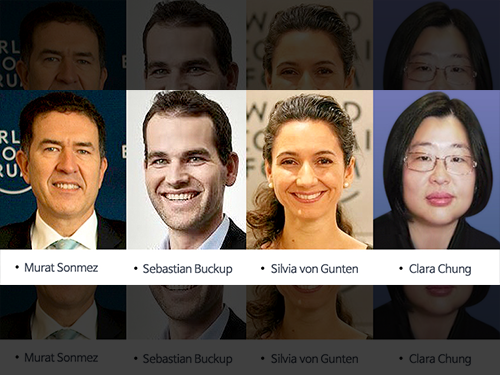 KAIST-WEF Roundtable on Inclusive Growth and Job Creation
The World Economic Forum (WEF) will join KAIST in an effort to address sweeping global problems in the wake of the Fourth Industrial Revolution. The two will co-host a roundtable on ‘Shaping Korea’s Priorities for Inclusive Growth and Job Creation in the Fourth Industrial Revolution’ on October 13 at Lotte Hotel in Seoul.
The roundtable will bring together leaders from government, industry, universities, and non-profit civic organizations to have an in-depth discussion on a thought-provoking agenda of inclusive growth and job creation which scientific and technological changes will bring about. The event will provide a platform to explore practical collaboration and innovative strategies for better job creation and innovation ecosystems.
The two will also sign an MOU for collaboration between the Fourth Industrial Revolution Information Center (FIRIC) of KAIST and the WEF Center for the Fourth Industrial Revolution (C4IR).
President Sung-Chul Shin of KAIST and the Head of the WEF Center for the Fourth Industrial Revolution, Murat Sonmez, will lead the panel discussion titled ‘Inclusive Growth and the Fourth Industrial Revolution’ which will be attended by leaders from government, industry, and non-profit civic organizations.
At the breakout sessions, the topics will be “Future Jobs” and the “Creation of Innovation Ecosystems”. Additionally, a discussion on the “SME 4.0 Initiative”, which is a program pushed forward by KAIST in collaboration with local governments, will talk about job creation through innovation in small and medium-sized enterprises (SMEs). The WEF will introduce their two-year activities and research on the Fourth Industrial Revolution, which have great potential and a high possibility of successfully undergoing the revolution, to Korea.
Since WEF Executive Chairman Klaus Schwab brought up the topic of the Fourth Industrial Revolution, the WEF has been leading agenda topics and discussions on high-profile matters, including ‘technology-driven but human-centered inclusive growth’ in predicting the future of jobs.
The WEF is a nonprofit organization committed to addressing the world’s weightiest problems. It is best known for its annual meetings in Davos, Switzerland, which attracts leaders from around the world. KAIST has been participating in this summit since 2009. President Shin will also attend the upcoming Davos summit next January. Distinguished Professor Sang Yup Lee who heads the KAIST Institute and the FIRIC is the co-chair of the Global Council on Biotechnology and a member of the Global Future Council on the Fourth Industrial Revolution at the WEF.
Moreover, President Shin and Mr. Sonmez will explain the background of the roundtable and share the results of the sessions at a joint news conference.
2017.09.28 View 10660
KAIST-WEF Roundtable on Inclusive Growth and Job Creation
The World Economic Forum (WEF) will join KAIST in an effort to address sweeping global problems in the wake of the Fourth Industrial Revolution. The two will co-host a roundtable on ‘Shaping Korea’s Priorities for Inclusive Growth and Job Creation in the Fourth Industrial Revolution’ on October 13 at Lotte Hotel in Seoul.
The roundtable will bring together leaders from government, industry, universities, and non-profit civic organizations to have an in-depth discussion on a thought-provoking agenda of inclusive growth and job creation which scientific and technological changes will bring about. The event will provide a platform to explore practical collaboration and innovative strategies for better job creation and innovation ecosystems.
The two will also sign an MOU for collaboration between the Fourth Industrial Revolution Information Center (FIRIC) of KAIST and the WEF Center for the Fourth Industrial Revolution (C4IR).
President Sung-Chul Shin of KAIST and the Head of the WEF Center for the Fourth Industrial Revolution, Murat Sonmez, will lead the panel discussion titled ‘Inclusive Growth and the Fourth Industrial Revolution’ which will be attended by leaders from government, industry, and non-profit civic organizations.
At the breakout sessions, the topics will be “Future Jobs” and the “Creation of Innovation Ecosystems”. Additionally, a discussion on the “SME 4.0 Initiative”, which is a program pushed forward by KAIST in collaboration with local governments, will talk about job creation through innovation in small and medium-sized enterprises (SMEs). The WEF will introduce their two-year activities and research on the Fourth Industrial Revolution, which have great potential and a high possibility of successfully undergoing the revolution, to Korea.
Since WEF Executive Chairman Klaus Schwab brought up the topic of the Fourth Industrial Revolution, the WEF has been leading agenda topics and discussions on high-profile matters, including ‘technology-driven but human-centered inclusive growth’ in predicting the future of jobs.
The WEF is a nonprofit organization committed to addressing the world’s weightiest problems. It is best known for its annual meetings in Davos, Switzerland, which attracts leaders from around the world. KAIST has been participating in this summit since 2009. President Shin will also attend the upcoming Davos summit next January. Distinguished Professor Sang Yup Lee who heads the KAIST Institute and the FIRIC is the co-chair of the Global Council on Biotechnology and a member of the Global Future Council on the Fourth Industrial Revolution at the WEF.
Moreover, President Shin and Mr. Sonmez will explain the background of the roundtable and share the results of the sessions at a joint news conference.
2017.09.28 View 10660 -
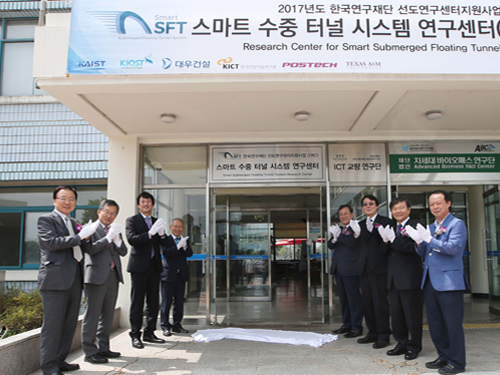 Research Center for Smart Submerged Floating Tunnel Systems Opens
(Distinguished guests including President Shin (fourth from the right) and Director Lee (third from left) at the opening ceremony)
The Research Center for a Smart Submerged Floating Tunnel Systems was recently established at KAIST with the purpose of taking the lead in developing fundamental and applicable technology for submerged floating tunnels as well as fostering creative and talented people. Haeng-Ki Lee, a professor in the Department of Civil & Environmental Engineering at KAIST is heading the center.
KAIST held its opening ceremony on September 7, 2017 in the Applied Engineering Building located on the main campus.
Distinguished guests, including KAIST president Sung-Chul Shin, the President of the Korea Institute of Ocean Science and Technology Gi-Hoon Hong, the President of the Korean Society of Civil Engineering Young-Seok Park, and the Director in the Division of Engineering at the National Research Foundation of Korea Joong-Kon Park attended the ceremony.
The National Research Foundation of Korea provides Engineering Research Center (ERC) projects which find and foster groups with outstanding research performance in a field of engineering. The projects support these groups so that they can strengthen their global competitiveness while enhancing national competence in basic research.
The ‘Research Center for Smart Submerged Floating Tunnel Systems’ was selected as one of the ERC projects in 2017. For the next seven years, the research center will work to develop a submerged floating tunnel system resistant depths greater than 100 meters.
To achieve its goal, the center has defined crucial research topics including: i) a structural analysis program and integrated design technology specific for submerged floating tunnel systems, ii) high-durability marine construction materials and submerged construction integrated systems, and iii) safety and maintenance integrated technology for smart submerged floating tunnel systems.
The ‘Research Center for Smart Submerged Floating Tunnel Systems’ will devote itself to developing a variety of fundamental and applicable technology that will be leading global maritime construction. Moreover, it will concentrate on fostering professional research manpower in related areas.
The Director of the Center Lee said, “The center will cooperate with KAIST researchers who are experts in various fields, including structures, materials, construction, and maritime research. Based on this collaboration, the center will contribute to achieving autonomous technologies by developing fundamental and applicable technology related with submerged floating tunnel systems. It will also take the role of a leading global research hub in the field of submerged floating tunnels as well as construction technologies.”
2017.09.07 View 10153
Research Center for Smart Submerged Floating Tunnel Systems Opens
(Distinguished guests including President Shin (fourth from the right) and Director Lee (third from left) at the opening ceremony)
The Research Center for a Smart Submerged Floating Tunnel Systems was recently established at KAIST with the purpose of taking the lead in developing fundamental and applicable technology for submerged floating tunnels as well as fostering creative and talented people. Haeng-Ki Lee, a professor in the Department of Civil & Environmental Engineering at KAIST is heading the center.
KAIST held its opening ceremony on September 7, 2017 in the Applied Engineering Building located on the main campus.
Distinguished guests, including KAIST president Sung-Chul Shin, the President of the Korea Institute of Ocean Science and Technology Gi-Hoon Hong, the President of the Korean Society of Civil Engineering Young-Seok Park, and the Director in the Division of Engineering at the National Research Foundation of Korea Joong-Kon Park attended the ceremony.
The National Research Foundation of Korea provides Engineering Research Center (ERC) projects which find and foster groups with outstanding research performance in a field of engineering. The projects support these groups so that they can strengthen their global competitiveness while enhancing national competence in basic research.
The ‘Research Center for Smart Submerged Floating Tunnel Systems’ was selected as one of the ERC projects in 2017. For the next seven years, the research center will work to develop a submerged floating tunnel system resistant depths greater than 100 meters.
To achieve its goal, the center has defined crucial research topics including: i) a structural analysis program and integrated design technology specific for submerged floating tunnel systems, ii) high-durability marine construction materials and submerged construction integrated systems, and iii) safety and maintenance integrated technology for smart submerged floating tunnel systems.
The ‘Research Center for Smart Submerged Floating Tunnel Systems’ will devote itself to developing a variety of fundamental and applicable technology that will be leading global maritime construction. Moreover, it will concentrate on fostering professional research manpower in related areas.
The Director of the Center Lee said, “The center will cooperate with KAIST researchers who are experts in various fields, including structures, materials, construction, and maritime research. Based on this collaboration, the center will contribute to achieving autonomous technologies by developing fundamental and applicable technology related with submerged floating tunnel systems. It will also take the role of a leading global research hub in the field of submerged floating tunnels as well as construction technologies.”
2017.09.07 View 10153 -
 KAIST to Open the Meditation Research Center
KAIST announced that it will open its Meditation Research Center next June. The center will serve as a place for the wellness of KAIST community as well as for furthering the cognitive sciences and its relevant convergence studies.
For facilitating the center, KAIST signed an MOU with the Foundation Academia Platonica in Seoul, an academy working for enriching the humanities and insight meditation on Aug.31. The Venerable Misan, a Buddhist monk well-known for his ‘Heart Smile Meditation’ program, will head the center.
The center will also conduct convergence research on meditation, which will translate into brain imaging, cognitive behavior, and its psychological effects. Built upon the research, the center expects to publish textbooks on meditation and will distribute them to the public and schools in an effort to widely disseminate the benefits of meditation.
As mindful meditation has become mainstream and more extensively studied, growing evidence suggests multiple psychological and physical benefits of these mindfulness exercises as well as for similar practices. Mind-body practices like meditation have been shown to reduce the body’s stress response by strengthening the relaxation response and lowering stress hormones.
The Venerable Misan, a Ph.D in philosophy from Oxford University, also serves as the director of the Sangdo Meditation Center and a professor at Joong-Ang Sangha University, a higher educational institution for Buddhist monks.
Monk Misan said that meditation will play a crucial part in educating creative students with an empathetic mindset. He added, “Hi-tech companies in Silicon Valley such as Google and Intel have long introduced meditation programs for stress management. Such practices will enhance the wellness of employees as well as their working efficiency.”
President Sung-Chul Shin said of the opening of the center, “From long ago, many universities in foreign countries including Havard, Stanford, Oxfor universities and the Max Planck Institute in Germany have applied scientific approaches to meditation and installed meditation centers. I am pleased to open our own center next year and I believe that it will bring more diverse opportunities for advancing convergent studies in AI and cognitive sciences.
2017.08.31 View 6669
KAIST to Open the Meditation Research Center
KAIST announced that it will open its Meditation Research Center next June. The center will serve as a place for the wellness of KAIST community as well as for furthering the cognitive sciences and its relevant convergence studies.
For facilitating the center, KAIST signed an MOU with the Foundation Academia Platonica in Seoul, an academy working for enriching the humanities and insight meditation on Aug.31. The Venerable Misan, a Buddhist monk well-known for his ‘Heart Smile Meditation’ program, will head the center.
The center will also conduct convergence research on meditation, which will translate into brain imaging, cognitive behavior, and its psychological effects. Built upon the research, the center expects to publish textbooks on meditation and will distribute them to the public and schools in an effort to widely disseminate the benefits of meditation.
As mindful meditation has become mainstream and more extensively studied, growing evidence suggests multiple psychological and physical benefits of these mindfulness exercises as well as for similar practices. Mind-body practices like meditation have been shown to reduce the body’s stress response by strengthening the relaxation response and lowering stress hormones.
The Venerable Misan, a Ph.D in philosophy from Oxford University, also serves as the director of the Sangdo Meditation Center and a professor at Joong-Ang Sangha University, a higher educational institution for Buddhist monks.
Monk Misan said that meditation will play a crucial part in educating creative students with an empathetic mindset. He added, “Hi-tech companies in Silicon Valley such as Google and Intel have long introduced meditation programs for stress management. Such practices will enhance the wellness of employees as well as their working efficiency.”
President Sung-Chul Shin said of the opening of the center, “From long ago, many universities in foreign countries including Havard, Stanford, Oxfor universities and the Max Planck Institute in Germany have applied scientific approaches to meditation and installed meditation centers. I am pleased to open our own center next year and I believe that it will bring more diverse opportunities for advancing convergent studies in AI and cognitive sciences.
2017.08.31 View 6669 -
 KAIST to Participate in the Summer Davos Forum
KAIST will participate in the 2017 Summer Davos Forum in Dalian, China from June 27 to 29. The Summer Davos Forum with the official title “Annual Meeting of New Champions” is an annual international meeting co-hosted by China and the World Economic Forum (WEF) to address global issues which has been held since 2007.
Focusing on this year’s theme ‘Achieving Inclusive Growth in the Fourth Industrial Revolution,’ science and technology experts from 90 different countries will participate in various sessions to present on and discuss pending global innovative issues. KAIST is to be the only Korean university to run ‘IdeasLab,’ in which researchers will introduce current research trends and discuss ideas with global leaders. This is the sixth year for KAIST to run IdeasLab.
This year’s IdeasLab has the theme ‘Materials of the Future,’ and will include presentations and discussions on materials developed at KAIST which could lead the Fourth Industrial Revolution. President Sung-Chul Shin, the chairman of the session, will first introduce the current status of KAIST and IdeasLab, followed by a presentation of cutting-edge integrated research findings by KAIST professors.
President Shin will also participate in various sessions organized by the Global University Leaders Forum (GULF) as discussion leader. President Shin is the only Korean member of GULF, a community comprised of the presidents of the world’s top 27 universities. Other members include the presidents of the University of Oxford and the University of Cambridge in the U.K., MIT, Harvard, Stanford, and Columbia Universities in the US, and the University of Tokyo in Japan.
Further, President Shin will participate in a strategy session for inclusive growth in the era of the Fourth Industrial Revolution and a meeting with the WEF directors.
The Dean of KAIST Institutes, Distinguished Professor Sang Yup Lee from the Chemical and Biomolecular Engineering Department, who has been invited to the Davos Forum and Summer Davos Forum for the last 15 years, is to present in the ‘Future of Life: Medicine’ session to introduce advancements in traditional medicine through systems biology such as his research on microbiomes (gut microbes).
Professor Lee, as the chair of the Global Future Council on Biotechnology at the WEF, and committee member of the Annual Meeting of the Global Future Councils on the Fourth Industrial Revolution, is to participate in various bio-sessions and the Fourth Industrial Revolution banquet session to lead the discussions.
President Shin said, “KAIST has been sharing global research findings with global leaders through IdeasLab at the Davos Forum for the past six years and it has always been well received.” He continued, “The forum will be the place for in-depth discussion on the technological changes that accompany the Fourth Industrial Revolution and human-centered development plan, as well as introducing innovative research and integrated research findings from KAIST.”
This year’s speakers include Li Keqiang, the current Premier of the State Council of China; Guo Ping, the rotating C.E.O. of Huawei; and Ya-Qin Zhang, the President of Baidu, a company leading technological innovation in various fields such as robotics and autonomous vehicles. Two thousand distinguished guests in politics, administration, finance, and academia from 90 countries are to participate in the meeting.
2017.06.21 View 9512
KAIST to Participate in the Summer Davos Forum
KAIST will participate in the 2017 Summer Davos Forum in Dalian, China from June 27 to 29. The Summer Davos Forum with the official title “Annual Meeting of New Champions” is an annual international meeting co-hosted by China and the World Economic Forum (WEF) to address global issues which has been held since 2007.
Focusing on this year’s theme ‘Achieving Inclusive Growth in the Fourth Industrial Revolution,’ science and technology experts from 90 different countries will participate in various sessions to present on and discuss pending global innovative issues. KAIST is to be the only Korean university to run ‘IdeasLab,’ in which researchers will introduce current research trends and discuss ideas with global leaders. This is the sixth year for KAIST to run IdeasLab.
This year’s IdeasLab has the theme ‘Materials of the Future,’ and will include presentations and discussions on materials developed at KAIST which could lead the Fourth Industrial Revolution. President Sung-Chul Shin, the chairman of the session, will first introduce the current status of KAIST and IdeasLab, followed by a presentation of cutting-edge integrated research findings by KAIST professors.
President Shin will also participate in various sessions organized by the Global University Leaders Forum (GULF) as discussion leader. President Shin is the only Korean member of GULF, a community comprised of the presidents of the world’s top 27 universities. Other members include the presidents of the University of Oxford and the University of Cambridge in the U.K., MIT, Harvard, Stanford, and Columbia Universities in the US, and the University of Tokyo in Japan.
Further, President Shin will participate in a strategy session for inclusive growth in the era of the Fourth Industrial Revolution and a meeting with the WEF directors.
The Dean of KAIST Institutes, Distinguished Professor Sang Yup Lee from the Chemical and Biomolecular Engineering Department, who has been invited to the Davos Forum and Summer Davos Forum for the last 15 years, is to present in the ‘Future of Life: Medicine’ session to introduce advancements in traditional medicine through systems biology such as his research on microbiomes (gut microbes).
Professor Lee, as the chair of the Global Future Council on Biotechnology at the WEF, and committee member of the Annual Meeting of the Global Future Councils on the Fourth Industrial Revolution, is to participate in various bio-sessions and the Fourth Industrial Revolution banquet session to lead the discussions.
President Shin said, “KAIST has been sharing global research findings with global leaders through IdeasLab at the Davos Forum for the past six years and it has always been well received.” He continued, “The forum will be the place for in-depth discussion on the technological changes that accompany the Fourth Industrial Revolution and human-centered development plan, as well as introducing innovative research and integrated research findings from KAIST.”
This year’s speakers include Li Keqiang, the current Premier of the State Council of China; Guo Ping, the rotating C.E.O. of Huawei; and Ya-Qin Zhang, the President of Baidu, a company leading technological innovation in various fields such as robotics and autonomous vehicles. Two thousand distinguished guests in politics, administration, finance, and academia from 90 countries are to participate in the meeting.
2017.06.21 View 9512 -
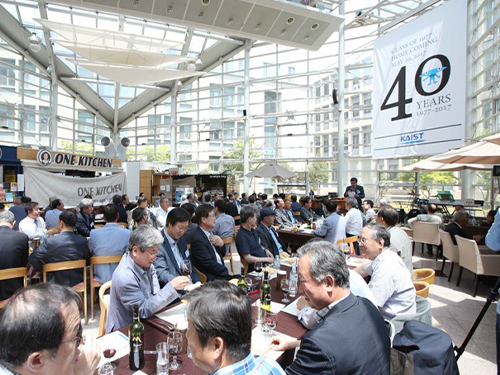 KAIST Class of '77 Celebrates 40-Year Reunion
The class of 1977 reunited on April 20 at the College of Business in Seoul campus, which was once the main campus when they were students 40 years ago. Now leaders of Korea in the sectors of industry, academia, and research, the class of ‘77 held a homecoming event in celebration of the 40th anniversary of their graduation.
The class of ’77 includes KAIST President Sung-Chul Shin and the Minister of Science, ICT and Future Planning Yanghee Choi. More than 100 graduates and 20 professors gathered at the homecoming event. Many of them were former ministers of science and technology, presidents of universities, heads of research institutes, and top managers from leading corporations such as Samsung Electronics and SK Telecom in Korea.
At the event, Professor Dong-Hoon Choi at Hangyang University, representing alumni Yoon-Mo Koo, Oh-Hyun Kwon, Dae-Young Kim, Yoo-Hyun Moon, Nam-Ho Paik, Ki Hwang Baek, Sung-Chul Shin, Mann-Ho Lee, and Sang-Bum Lee, donated a scholarship of 100 million KRW. Professor Choi said that, “This may not be a large sum of money, but we raised it with grateful hearts for the country and for KAIST. I hope this scholarship will become a small seed to raise bigger fruit.”
President Shin reminisced that, “The achievements made at KAIST during the last half century were only possible due to the dreams, visions, and innovative ideas of those who established KAIST, and the passion for research, education, and learning of our former professors and students.”
President Shin continued, “KAIST was the light of hope in the early industrialization period in Korea half a century ago, and as alumnus president I will devote body and soul for KAIST to be the light of hope in the early stages of the Industry 4.0, and thus continue to be the light of hope for the future of Korea.”
Notable guests presented include Former Minister of Science and Technology and former Provost of KAIST Kun-Mo Chung, Former Minister of Communications and former Professor Soon-Hoon Bae, Vice Chairman and CEO for Samsung Electronics Oh-Hyun Kwon, SK Telecom ICT President for Technology Ho-Soo Lee; President of Yeungnam University Gil Soo Sur; former President of the University of Seoul Sang-Bum Lee; President of the Korea Research Institute of Chemical Technology Kew-Ho Lee; and former President of the Korea Research Institute of Bioscience and Biotechnology Sang-Ki Rhee.
2017.05.23 View 6902
KAIST Class of '77 Celebrates 40-Year Reunion
The class of 1977 reunited on April 20 at the College of Business in Seoul campus, which was once the main campus when they were students 40 years ago. Now leaders of Korea in the sectors of industry, academia, and research, the class of ‘77 held a homecoming event in celebration of the 40th anniversary of their graduation.
The class of ’77 includes KAIST President Sung-Chul Shin and the Minister of Science, ICT and Future Planning Yanghee Choi. More than 100 graduates and 20 professors gathered at the homecoming event. Many of them were former ministers of science and technology, presidents of universities, heads of research institutes, and top managers from leading corporations such as Samsung Electronics and SK Telecom in Korea.
At the event, Professor Dong-Hoon Choi at Hangyang University, representing alumni Yoon-Mo Koo, Oh-Hyun Kwon, Dae-Young Kim, Yoo-Hyun Moon, Nam-Ho Paik, Ki Hwang Baek, Sung-Chul Shin, Mann-Ho Lee, and Sang-Bum Lee, donated a scholarship of 100 million KRW. Professor Choi said that, “This may not be a large sum of money, but we raised it with grateful hearts for the country and for KAIST. I hope this scholarship will become a small seed to raise bigger fruit.”
President Shin reminisced that, “The achievements made at KAIST during the last half century were only possible due to the dreams, visions, and innovative ideas of those who established KAIST, and the passion for research, education, and learning of our former professors and students.”
President Shin continued, “KAIST was the light of hope in the early industrialization period in Korea half a century ago, and as alumnus president I will devote body and soul for KAIST to be the light of hope in the early stages of the Industry 4.0, and thus continue to be the light of hope for the future of Korea.”
Notable guests presented include Former Minister of Science and Technology and former Provost of KAIST Kun-Mo Chung, Former Minister of Communications and former Professor Soon-Hoon Bae, Vice Chairman and CEO for Samsung Electronics Oh-Hyun Kwon, SK Telecom ICT President for Technology Ho-Soo Lee; President of Yeungnam University Gil Soo Sur; former President of the University of Seoul Sang-Bum Lee; President of the Korea Research Institute of Chemical Technology Kew-Ho Lee; and former President of the Korea Research Institute of Bioscience and Biotechnology Sang-Ki Rhee.
2017.05.23 View 6902 -
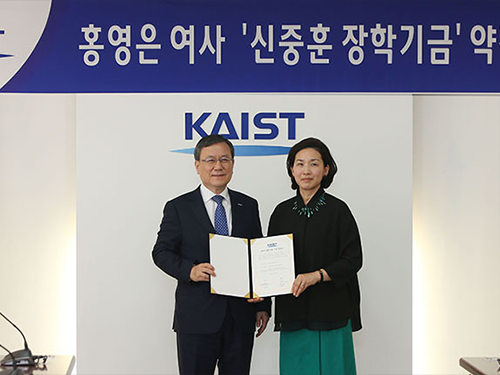 Scholarship in Memory of Professor Shin Endowed by His Family
Professor Joong-Hoon Shin of the Graduate School of Nanoscience and Technology was touted as a genius young scientist who would take the lead in nanoscience technology. After earning degrees from Harvard and the Caltech, he was appointed at KAIST at age 27. He was the youngest professor ever appointed in Korea.
Professor Shin’s outstanding research in the field of semiconductor nano-optics led him to be named as the ‘Scientist of the Year’ for three consecutive years from 2004 by the most prestigious scientist and technology organizations including the Korean Academy Science and Technology, the National Research Foundation of Korea, and the Korean government. However, a fatal car accident last September on the way home from a seminar in Gangwon Province took his life and a promising scholar’s research was left unfinished. He was 47 years old.
Mrs. Young-Eun Hong, the widow of the late Professor Shin, made a 100 million KRW gift to KAIST to establish the ‘Joong-Hoon Shin Scholarship’ on April 7. The scholarship will provide financial assistance to outstanding students of physics and nanoscience.
At the donation ceremony attended by President Sung-Chul Shin, Professor Shin’s colleagues and students, and family members, Mrs. Hong said, “My family would like to help young students achieve their dreams on behalf of my husband. I hope students will remember my husband’s passion and dedication toward his studies for a long time. He was a very hard worker.”
Working at KAIST, Professor Shin made significant achievements in field of semiconductor nano-optics, specializing in silicon photonics and silicon nanocrystal structures. In particular, his research team gained attention reproducing the structure of ‘Morpho butterfly’ wings, which produce the same colors from various angles, using external light as a light source without extra power. Their research led to the creation of original technology dubbed the biomimetics reflective display and was published in Nature in 2012.
Professor Shin’s legacy still endures. In February, a research team under Professor Shin-Hyun Kim of the Department of Chemical and Biomolecular Engineering includingthe late Professor Shin’s doctoral student Seung Yeol Lee, posthumously dedicated their research published on Advanced Materials to Professor Shin. ( click )
KAIST President Sung-Chul Shin, who is also a physicist, said “His passing is a great loss to the whole scientific and technology community, at home and abroad. But Joong-Hoon Shin scholarship will enable the growth and ensure the strength of nanoscience and its education at KAIST. We will uphold Professor Shin’s legacy by doing our best to make KAIST a world-leading university which can create global value.”
Mrs. Hong said she will continue her husband’s academic legacy at his alma maters, Harvard and the Caltech, where he earned his BS in physics and his Ph.D. in applied physics respectively. She said she will start fundraising to establish the Joong-Hoon Shin Scholarship at Harvard and Caltech from July.
(Mrs. Hong poses with President Sung-Chul Shin after donating 100 million KRW for establishing 'Joong-Hoon Shin Scholarship' in memory of her husband on April 7.)
2017.04.10 View 8430
Scholarship in Memory of Professor Shin Endowed by His Family
Professor Joong-Hoon Shin of the Graduate School of Nanoscience and Technology was touted as a genius young scientist who would take the lead in nanoscience technology. After earning degrees from Harvard and the Caltech, he was appointed at KAIST at age 27. He was the youngest professor ever appointed in Korea.
Professor Shin’s outstanding research in the field of semiconductor nano-optics led him to be named as the ‘Scientist of the Year’ for three consecutive years from 2004 by the most prestigious scientist and technology organizations including the Korean Academy Science and Technology, the National Research Foundation of Korea, and the Korean government. However, a fatal car accident last September on the way home from a seminar in Gangwon Province took his life and a promising scholar’s research was left unfinished. He was 47 years old.
Mrs. Young-Eun Hong, the widow of the late Professor Shin, made a 100 million KRW gift to KAIST to establish the ‘Joong-Hoon Shin Scholarship’ on April 7. The scholarship will provide financial assistance to outstanding students of physics and nanoscience.
At the donation ceremony attended by President Sung-Chul Shin, Professor Shin’s colleagues and students, and family members, Mrs. Hong said, “My family would like to help young students achieve their dreams on behalf of my husband. I hope students will remember my husband’s passion and dedication toward his studies for a long time. He was a very hard worker.”
Working at KAIST, Professor Shin made significant achievements in field of semiconductor nano-optics, specializing in silicon photonics and silicon nanocrystal structures. In particular, his research team gained attention reproducing the structure of ‘Morpho butterfly’ wings, which produce the same colors from various angles, using external light as a light source without extra power. Their research led to the creation of original technology dubbed the biomimetics reflective display and was published in Nature in 2012.
Professor Shin’s legacy still endures. In February, a research team under Professor Shin-Hyun Kim of the Department of Chemical and Biomolecular Engineering includingthe late Professor Shin’s doctoral student Seung Yeol Lee, posthumously dedicated their research published on Advanced Materials to Professor Shin. ( click )
KAIST President Sung-Chul Shin, who is also a physicist, said “His passing is a great loss to the whole scientific and technology community, at home and abroad. But Joong-Hoon Shin scholarship will enable the growth and ensure the strength of nanoscience and its education at KAIST. We will uphold Professor Shin’s legacy by doing our best to make KAIST a world-leading university which can create global value.”
Mrs. Hong said she will continue her husband’s academic legacy at his alma maters, Harvard and the Caltech, where he earned his BS in physics and his Ph.D. in applied physics respectively. She said she will start fundraising to establish the Joong-Hoon Shin Scholarship at Harvard and Caltech from July.
(Mrs. Hong poses with President Sung-Chul Shin after donating 100 million KRW for establishing 'Joong-Hoon Shin Scholarship' in memory of her husband on April 7.)
2017.04.10 View 8430 -
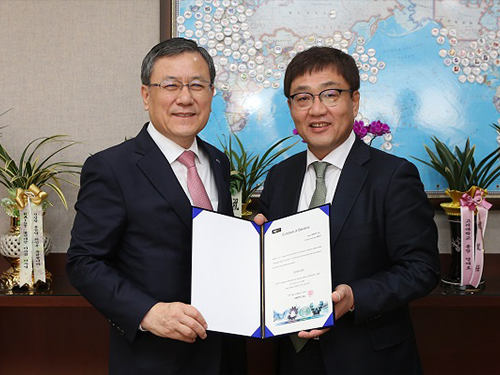 ANSYS Korea Donates Engineering Simulation Software
ANSYS Korea made an in-kind donation of engineering simulation software, Multiphysics Campus Solution, to KAIST on March 24. ANSYS Korea donated 10,000 copies for education and 1,000 copies for research valued at about 4 billion KRW (about 200 billion KRW commercially).
The ANSYS software will benefit the engineering simulation work in nine departments and 60 labs for three years, including the departments of mechanical engineering, aerospace engineering, electrical engineering, civil and environmental engineering, nuclear and quantum engineering, chemical and bimolecular engineering, bio and brain engineering, materials science and engineering, and the Cho Chun Shik Graduate School of Green Transportation.
ANSYS is a global engineering simulation company. It provides ANSYS CAE (Computer Aided Engineering) software products in various industries in the world as well as various support, training, and consulting services. Deemed an exemplary model of university-industry R&D collaboration especially in the Industry 4.0 era, their donation will help create the best engineering education environment possible at KAIST.
ANSYS's multi-physics campus solution is a comprehensive software suite that spans the entire range of physics, providing access to virtually any field of engineering simulation that a design process requires. It expands the fields of fluids, structures, electromagnetics, and semiconductors. Undergraduates use it to learn physics principles and gain hands-on, real-world experience that can lead to a deeper understanding of engineering concepts. Postgraduate researchers apply simulation tools to solve complex engineering problems and produce data for their theses.
"Engineering simulations are playing a stronger role in science and engineering. ANSYS software will help our undergraduates and our researchers learn the principles of physics and deepen their understanding of engineering concepts. We hope this will serve as an instrumental tool for multidisciplinary studies, critical to fostering our students," said President Sung-Chul Shin.
ANSYS Korea CEO Yong-Won Cho added, "We sincerely hope our software will help KAIST students and researchers experience the best engineering education and achieve significant research results."
(Photo caption: President Shin (left) poses with ANSYS Korea CEO Yong-Won Cho at the donation ceremony on March 24 at KAIST)
2017.03.24 View 9477
ANSYS Korea Donates Engineering Simulation Software
ANSYS Korea made an in-kind donation of engineering simulation software, Multiphysics Campus Solution, to KAIST on March 24. ANSYS Korea donated 10,000 copies for education and 1,000 copies for research valued at about 4 billion KRW (about 200 billion KRW commercially).
The ANSYS software will benefit the engineering simulation work in nine departments and 60 labs for three years, including the departments of mechanical engineering, aerospace engineering, electrical engineering, civil and environmental engineering, nuclear and quantum engineering, chemical and bimolecular engineering, bio and brain engineering, materials science and engineering, and the Cho Chun Shik Graduate School of Green Transportation.
ANSYS is a global engineering simulation company. It provides ANSYS CAE (Computer Aided Engineering) software products in various industries in the world as well as various support, training, and consulting services. Deemed an exemplary model of university-industry R&D collaboration especially in the Industry 4.0 era, their donation will help create the best engineering education environment possible at KAIST.
ANSYS's multi-physics campus solution is a comprehensive software suite that spans the entire range of physics, providing access to virtually any field of engineering simulation that a design process requires. It expands the fields of fluids, structures, electromagnetics, and semiconductors. Undergraduates use it to learn physics principles and gain hands-on, real-world experience that can lead to a deeper understanding of engineering concepts. Postgraduate researchers apply simulation tools to solve complex engineering problems and produce data for their theses.
"Engineering simulations are playing a stronger role in science and engineering. ANSYS software will help our undergraduates and our researchers learn the principles of physics and deepen their understanding of engineering concepts. We hope this will serve as an instrumental tool for multidisciplinary studies, critical to fostering our students," said President Sung-Chul Shin.
ANSYS Korea CEO Yong-Won Cho added, "We sincerely hope our software will help KAIST students and researchers experience the best engineering education and achieve significant research results."
(Photo caption: President Shin (left) poses with ANSYS Korea CEO Yong-Won Cho at the donation ceremony on March 24 at KAIST)
2017.03.24 View 9477